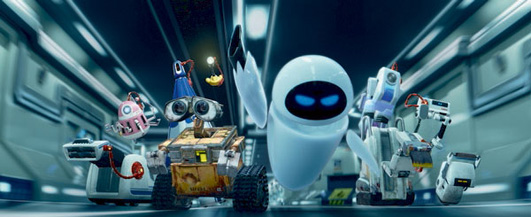2009 Calvin Awards: Best Screenplay
February 13, 2009
BoxOfficeProphets.com

The script doesn't suffer when it moves off Earth and into space, either, as our plucky robot hero maneuvers his way though a strange cast of robotic and human characters and does battle with the film's ostensible "villain", one with a coldly logical rationale. The script is triumph of not just making do with less, but making less into everything.
A more traditional screenplay follows with Martin McDonagh's In Bruges, close behind WALL-E in second place. The story of two hitman in exile in the small Belgian tourist town of Bruges after a job gone bad, it follows them as they interact, poorly, with the residents of the town while awaiting further instructions. Colin Farrell's hysterical interactions with overweight people, dwarves – no, wait – little people, and the town's drug dealers make for crackerjack dialogue. It's not all about the funny words, though, as each interaction ends up playing a role in the film's dénouement, tying the movie up in a nice little package.
Third place goes to the Nolan brothers' script for The Dark Knight. Not only did the script give us our most terrifying Joker yet in the history of Batman films, it got to the depth of the interaction between the series' ultimate villain and its hero. Finally showing them as the mirror images of each other as we knew they were, it elevated the film from mere superhero drama to an allegory about society in general, and what it truly means to work outside the law.
Fourth place goes to John Patrick Shanley's adaptation of his own stage play, Doubt. Taking place in a Catholic parochial school in the 1960s, a time of radical change in the church, it deals with strong characters wrestling over the small amounts of power they have, and the way that rumors can have a dramatic effect on someone's career. Through direct conflict and through icily worded monologues, the script gets to the heart of important questions of faith and tolerance.
Fifth spot goes to Simon Beaufoy's script for Slumdog Millionaire. Adapted from a novel, it told the story of an Indian boy born into poverty and his attempts to survive with his brother amidst gangsters and those that would exploit them. A kind of modernized fairy tale, it's bracketed by the main character's appearance on the Indian version of Who Wants to Be A Millionaire. Each of the questions he answers illustrate a period in Jamal's history, as he hopes to reconnect to the love of his life that he grew up with on the streets. That framing device proves to be the key to the story, letting us connect with characters from an entirely different culture over the course of decades.
Sixth spot goes to Peter Morgan for Frost/Nixon, who's becoming the go-to guy for recent historical recreations. Morgan had a difficult job in presenting the urgency of an event that happened 30 years ago and where the actual records of it are available to the public to watch themselves. Working from his own play, Morgan created a classic underdog story, of a poorly regarded journalist taking on the champ, with both their careers on the line. Breathing life into the Frost/Nixon interviews and the people behind them, Morgan made the events come to life and made them just as relevant to today as they were then.
Rachel Getting Married comes in at seventh, with its tale of an addict attempting to reconcile with her family during her sister's wedding. Written by Jenny Lumet, it's full of acid-tongued exchanges over long-held grudges and important heart-to-hearts. It's a story of healing and family, which comes together to bring hope.
Robert Siegel's script for The Wrestler was voted in at eighth spot. Far more than a sports movie, the script helped us get inside the head of entertainers that just can't give up the spotlight because they don't know what else to do, and what that costs them both physically and socially. It's a powerful film about people who know they're over the hill but can't do anything about it.
Iron Man's script, from its four writers, ended up ninth. While it's tempting to overlook the scripts of superhero films like this, since so much relies on the action on screen, it would do a great disservice to this one. This script gives us a great redemption story, following Tony Stark's arc from industrialist to a technological avenger, as well as providing one of the better origin stories ever in the superhero game.
Thomas McCarthy's The Visitor wraps up our top ten list. While for a large part an actor's showcase, the screenplay for The Visitor was crucial in giving these performers an emotional base to play from. McCarthy seems to specialize in these kind of stories about odd groups of people coming together to form friendships (see: The Station Agent), and this is one of his finest illustrations of the need for people to connect. (Reagen Sulewski/BOP)
Best Actor
Best Actress
Best Album
Best Cast
Best Director
Best DVD
Best Overlooked Film
Best Picture
Best Scene
Best Supporting Actor
Best Supporting Actress
Best TV Show
Best Use of Music
Best Videogame
Breakthrough Performance
Worst Performance
Worst Picture